Nutrition is pivotal in managing kidney disease in dogs. Since dogs with this condition often feel unwell, the initial focus is on encouraging them to eat specialized kidney diet dog food.
Kidney disease can induce nausea and lead to mouth or stomach ulcers, causing discomfort during meals. In severe cases, a feeding tube may be essential to ensure adequate nutrition intake.
Once your dog’s condition stabilizes, you can prioritize providing optimized nutrition. Kidney diet for dogs must meet various requirements. Here’s a comprehensive guide outlining nutritional needs and suitable options for dogs with kidney disease, including specialized kidney diet dog food.
Best Kidney Diet for Dogs
Following a diagnosis of kidney disease and stabilization of your dog’s condition, veterinarians often suggest transitioning to a prescription kidney diet. Your veterinarian may recommend a specific food tailored to your dog’s needs. Here are three well-known options:
Blue Buffalo Veterinary Diet Wet Dog Food
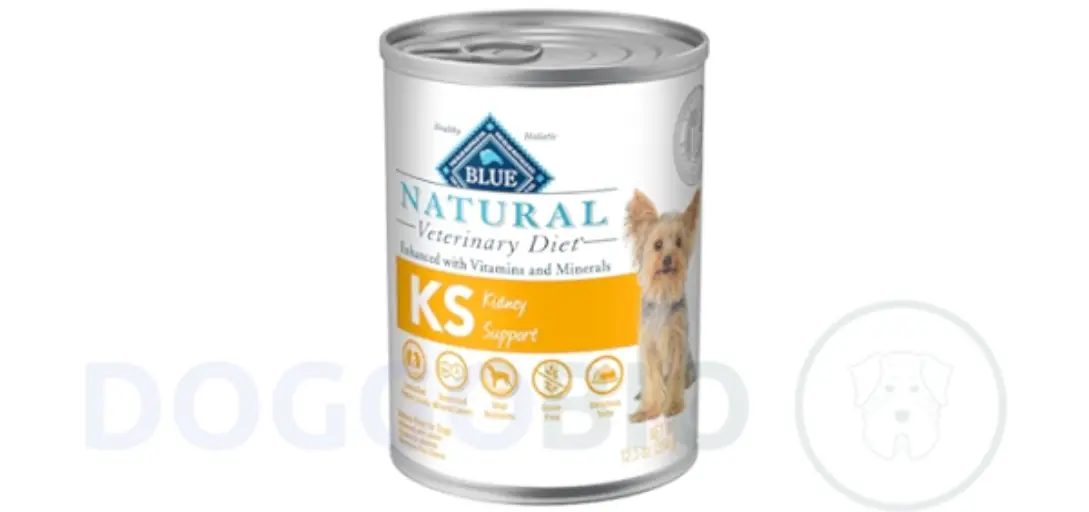
Blue Buffalo Natural Veterinary Diet Wet Dog Food Kidney Support
Blue Buffalo’s Veterinary Diet Wet Dog Food Kidney Support, endorsed by Dr. Georgia Jeremiah, features real chicken and controlled phosphorus, promoting kidney health.
Its high moisture content aids hydration, making it a trusted choice for dogs with kidney issues.
Pros
Recommended by Dr. Jeremiah
Controlled protein levels from real chicken
High moisture content for hydration
Suitable phosphorus levels
The dry version is available for transitioning
Cons
Requires veterinary authorization for purchase
Higher cost compared to other options
Past recalls (last in 2017)
Availability may be limited
Dr. Georgia Jeremiah, a pet nutrition expert and Wag! ‘s veterinary consultant, recommends Blue Buffalo for its versatile formulations catering to various dog needs.
Designed explicitly for renal disease, their recipe prioritizes controlled protein levels sourced from real chicken and broth, supplemented with omega-3 fatty acids and antioxidants. While a dry version exists, we focus on the wet option for enhanced hydration, both standing out for kidney disease management.
Pet Parents’ Feedback: Pet owners praise Blue Buffalo Kidney Support Wet Dog Food for its positive impact on their dogs’ health and appetite, often outperforming other prescription options.
Forza10 Nutraceutic Actiwet Renal Support
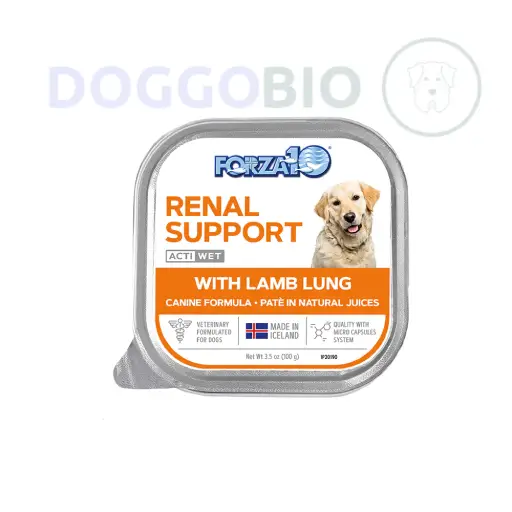
Forza10 Nutraceutic Actiwet Renal Support Wet Dog Food
Forza10 Nutraceutic Actiwet Renal Support Wet Dog Food, crafted by a vet-founded brand, offers science-backed nutrition.
It is tailored for kidney issues and features high-quality lamb lung and balanced phosphorus and sodium levels.
It supports kidney function and hydration without artificial additives, making it a trusted choice among pet owners.
Pros
Quality protein from pasture-raised lambs
Free from artificial additives
The moist formula aids hydration for kidney health
Balanced phosphorus and sodium levels for renal dogs
Cons
Slightly higher price
Small cans, especially for larger dogs
Limited flavor options may be challenging for picky eaters
Founded by a veterinarian in 1995, Forza10 prioritizes scientific research in crafting nutritional pet food. Their Renal Support recipe exemplifies this commitment. It has lower protein levels, is sourced from high-quality New Zealand lamb lung, and is tailored for dogs with renal issues.
Including cranberries, dried dandelion, and clover supports kidney function, while reduced phosphorus and sodium levels align with renal diet requirements. Free from artificial additives, it’s a wholesome choice for kidney health.
Feedback: “After a year, I finally found a kidney care diet my very picky little dog eats all at once. She eats most renal diets the first time and then doesn’t like them the next time. So happy to find a low-protein kidney food she enjoys!”
Dave’s Pet Food Veterinarian Formulated
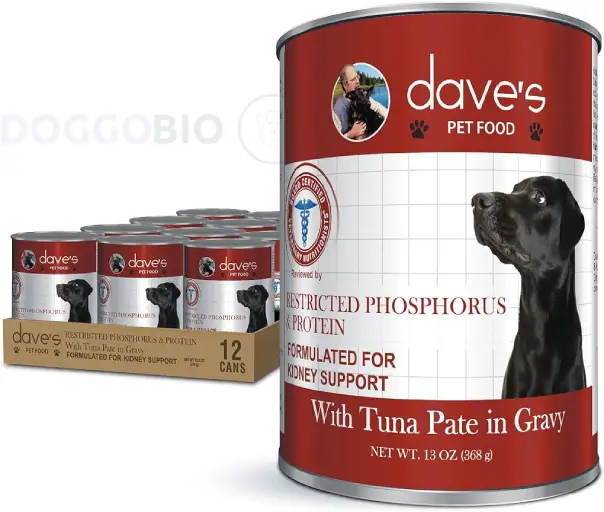
Dave’s Pet Food Veterinarian Formulated Restricted Phosphorus & Protein Kidney Support
This product boasts real chicken and tuna for top-quality protein, with low levels of additional meat.
Expertly formulated with veterinarian guidance, it ensures hydration with high moisture content.
Yet, its small can size, single flavor option, and manufacturing in Thailand should be noted.
Pros
Real chicken and tuna
Low protein levels allow additional meat
High moisture content hydrates
Formulated with vet guidance
Cons
Small can size for larger breeds
Single flavor option for picky eaters
Manufactured in Thailand, not the USA
Dave’s Pet Food, guided by veterinary nutritionists, offers solutions for various dietary needs, including kidney disease. It’s a cost-effective choice with quality protein sources like tuna and chicken, minimal phosphorus, and essential vitamins and minerals. Though slightly pricier than some, it’s the most budget-friendly option on our list.
Feedbacks: “My pug has a susceptible stomach. The vet put him on a prescription diet, but he hated the food. He wouldn’t eat. So I read reviews of a bland diet of Dave’s chicken and rice. I decided to give it a try. I’m glad my pug likes it, and it helps his stomach. He also has regular bowel movements, which makes us all happy. Suppose your dog has a sensitive stomach. I recommend you give it a try.
Rayne Nutrition Crocodilia MAINT
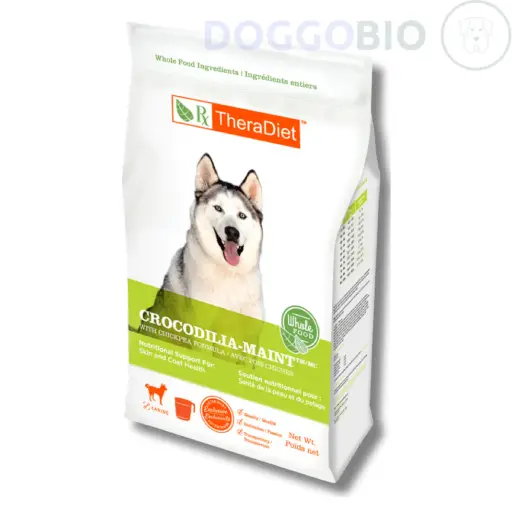
Rayne Nutrition Crocodilia MAINT
Rayne Nutrition Crocodilia MAINT is a novel option for dogs with meat allergies, featuring alligator protein.
It’s designed to support kidney health with reduced phosphorus and sodium levels, while omega fatty acids help alleviate inflammation.
However, it’s only available on Rayne Nutrition’s website, adding an exclusive touch to the product.
Pros
Alligator protein is ideal for meat-allergic dogs
Low phosphorus and sodium ease kidney strain
Omega fatty acids reduce kidney inflammation
Limited ingredients suit sensitive stomachs
Cons
High protein may not suit advanced renal disease
Dry formula lacks hydration support
For dogs grappling with kidney disease and food allergies, mealtime can be tricky. Rayne Nutrition steps in with a solution, offering a recipe featuring alligators as a novel protein source. Sensible stomachs can find relief with limited natural ingredients like dried chickpeas and peas.
Additionally, plant-based Omega fatty acids, such as DHA and EPA, provide anti-inflammatory benefits that can support kidney health.
However, it’s vital to note that this formula may not suit all dogs with kidney issues, especially those in advanced stages. While phosphorus and sodium levels are low, protein content exceeds other options. Always consult a vet before transitioning a dog with kidney disease to a new diet.
Feedback: “My dog has IBD and is borderline [lymphangiectasia]. He is susceptible to fat levels in his food. I was happy to find this food, as it has been difficult to find something that is [a] novel protein that he wants to eat and won’t give him diarrhea.”
How Do I Choose The Best Kidney Diet for Dogs?
A kidney support diet for dogs with CKD typically includes:
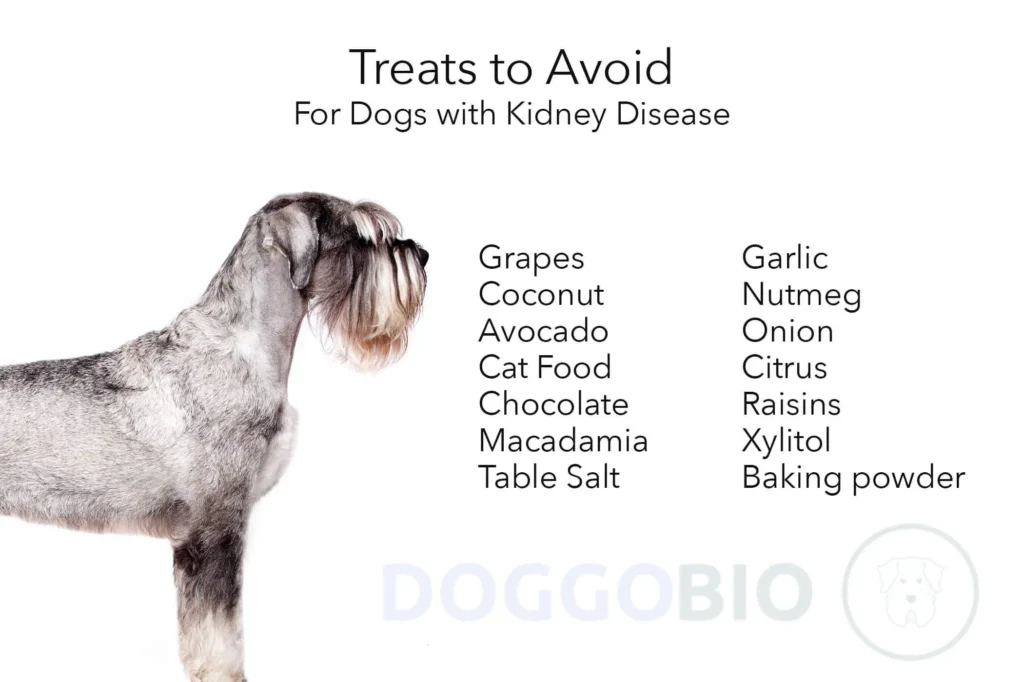
- Protein: 14-20%
- Phosphorus: 0.2 – 0.5%
- Sodium: ≤ 0.3%
- Omega-3 fatty acids: 0.4 – 2.5%
Your vet will assist in selecting the best option. Ensure adequate calorie density for proper body condition with portion control and regular weigh-ins.
Commercial kidney support diets are often delicious, aiding in CKD management. If needed, enhance the flavor with water, tuna juice, or low-sodium chicken broth.
Frequently Ask Question
What is Kidney Disease in Dogs?
Before addressing dietary management, it’s vital to grasp the role of kidneys and their disease susceptibility.
- Kidney disease in dogs, also termed renal failure or renal disease, occurs when these organs malfunction. Essential functions include filtering waste, balancing electrolytes and pH, and producing hormones.
- It can be acute or chronic. Acute cases arise suddenly from toxin exposure or trauma, sometimes progressing to chronic kidney disease (CKD), which deteriorates gradually and leads to uremia.
- While CKD has no cure, treatments aim to slow its progression, often involving therapeutic nutrition to support kidney function.
How do the dietary needs of dogs with CKD differ?
- Water. CKD weakens the kidneys’ ability to concentrate urine, leading to increased thirst to flush out toxins. Ensure constant access to fresh water, and consider incorporating canned food for added hydration. Change water frequently and clean bowls daily.
- Protein. Reduced protein intake lessens the kidneys’ workload and preserves function. Aim for 14-20% protein on a dry matter basis.
- Phosphorus. Limiting phosphorus intake delays CKD progression. Aim for 0.2-0.5% phosphorus on a dry matter basis by restricting protein.
- Sodium. Moderating dietary sodium levels mildly eases the kidneys’ workload, contributing to maintaining optimal blood pressure.
- Omega-3 fatty acids. Dietary omega-3 fatty acids aid in curtailing the production of inflammatory compounds that induce oxidative stress in diseased kidney tissues, thus slowing CKD progression. This mechanism works by mitigating protein ‘leakage’ through the kidneys.
Does a dog with kidney disease need dry, wet, fresh, or raw food?
For dogs with kidney disease, a diet low in protein is essential.
- Fresh and raw dog foods typically have high protein content, making them unsuitable for this condition.
- Instead, specially formulated dry or wet dog food is recommended. Wet food, with its high moisture content, aids hydration, which is crucial for dogs prone to dehydration due to frequent urination caused by kidney disease. Dry food, if formulated for kidney disease, is suitable, often more budget-friendly and convenient, and assists in weight management.
Conclusion
In conclusion, implementing a Kidney Diet for Dogs is essential for effectively managing kidney disease in our beloved canine companions. By providing carefully tailored nutrition aimed at supporting kidney function and overall health, we can significantly improve their quality of life and potentially extend their lifespan.
Consulting with veterinary professionals to create a personalized diet plan and closely monitoring our dogs’ health ensures that they receive the best possible care and attention. With dedication and proper nutrition, we can help our furry friends thrive despite facing the challenges of kidney disease.
